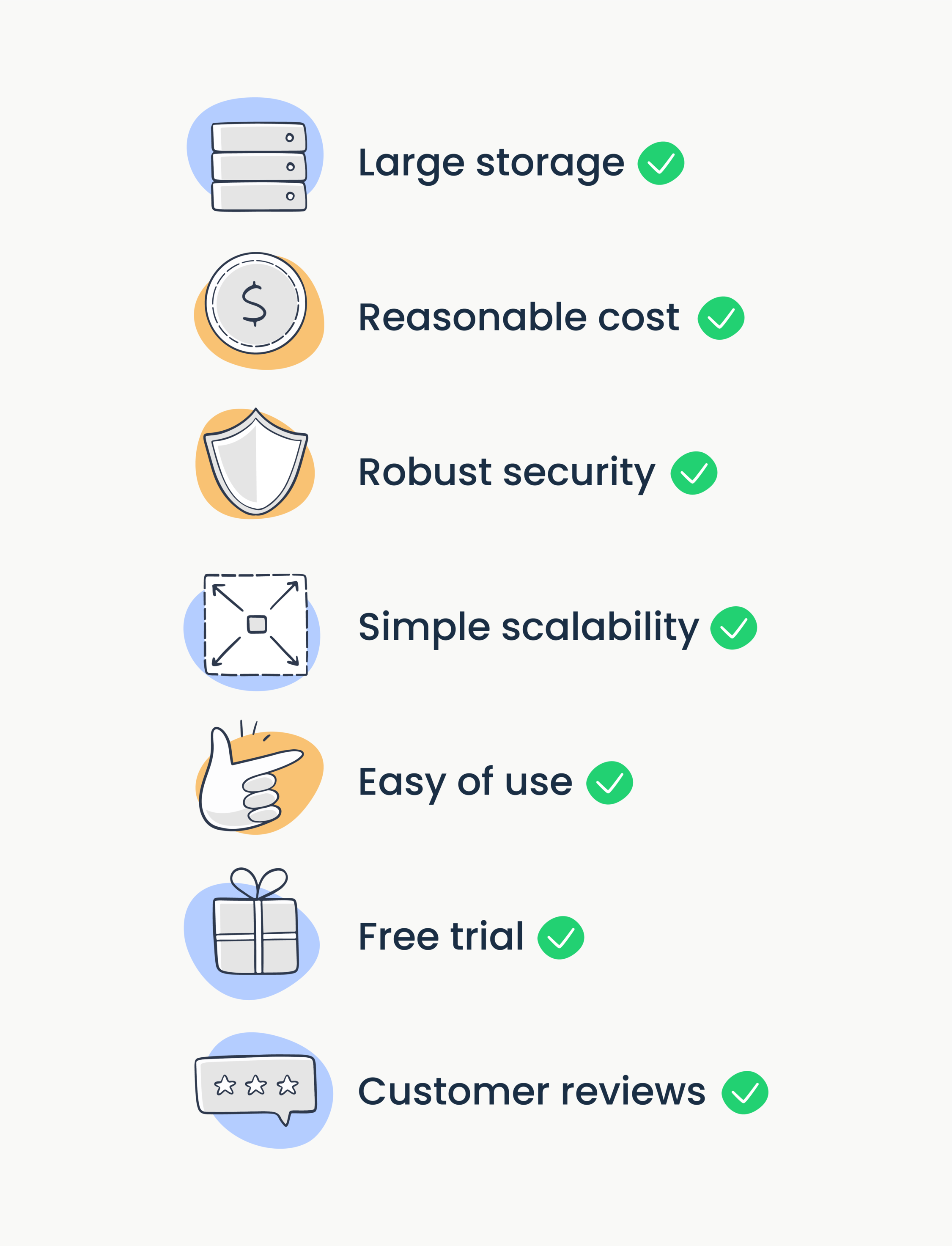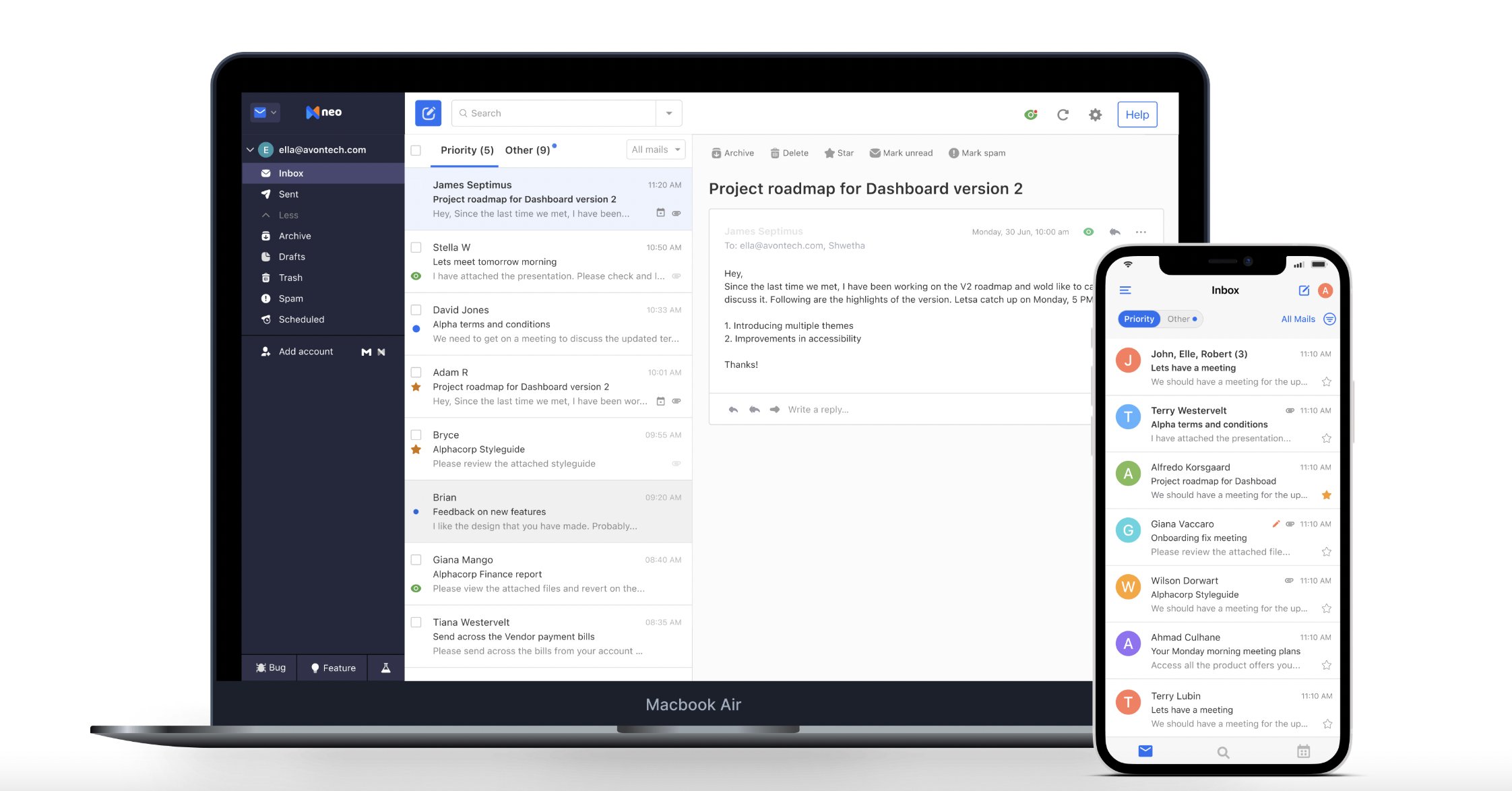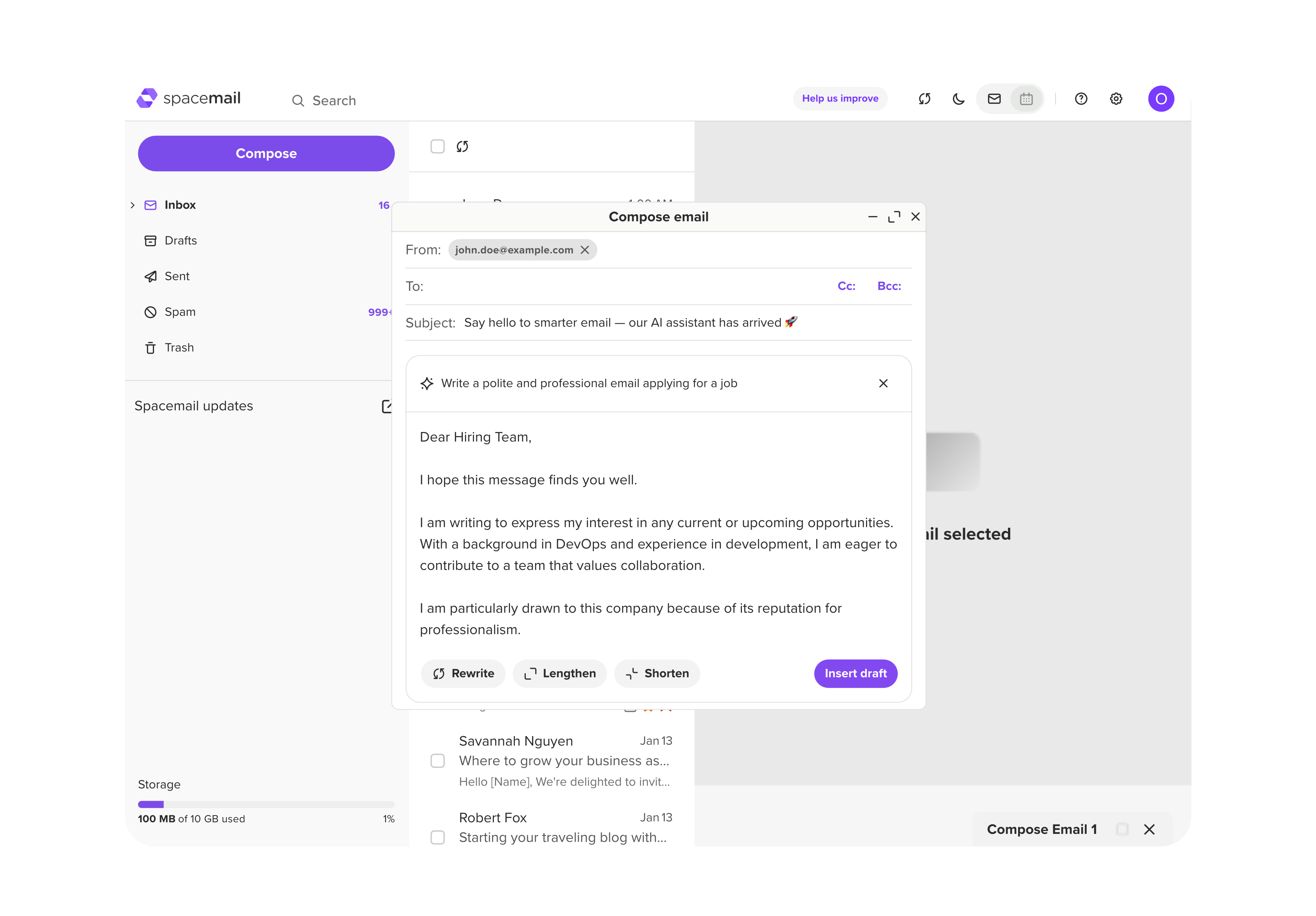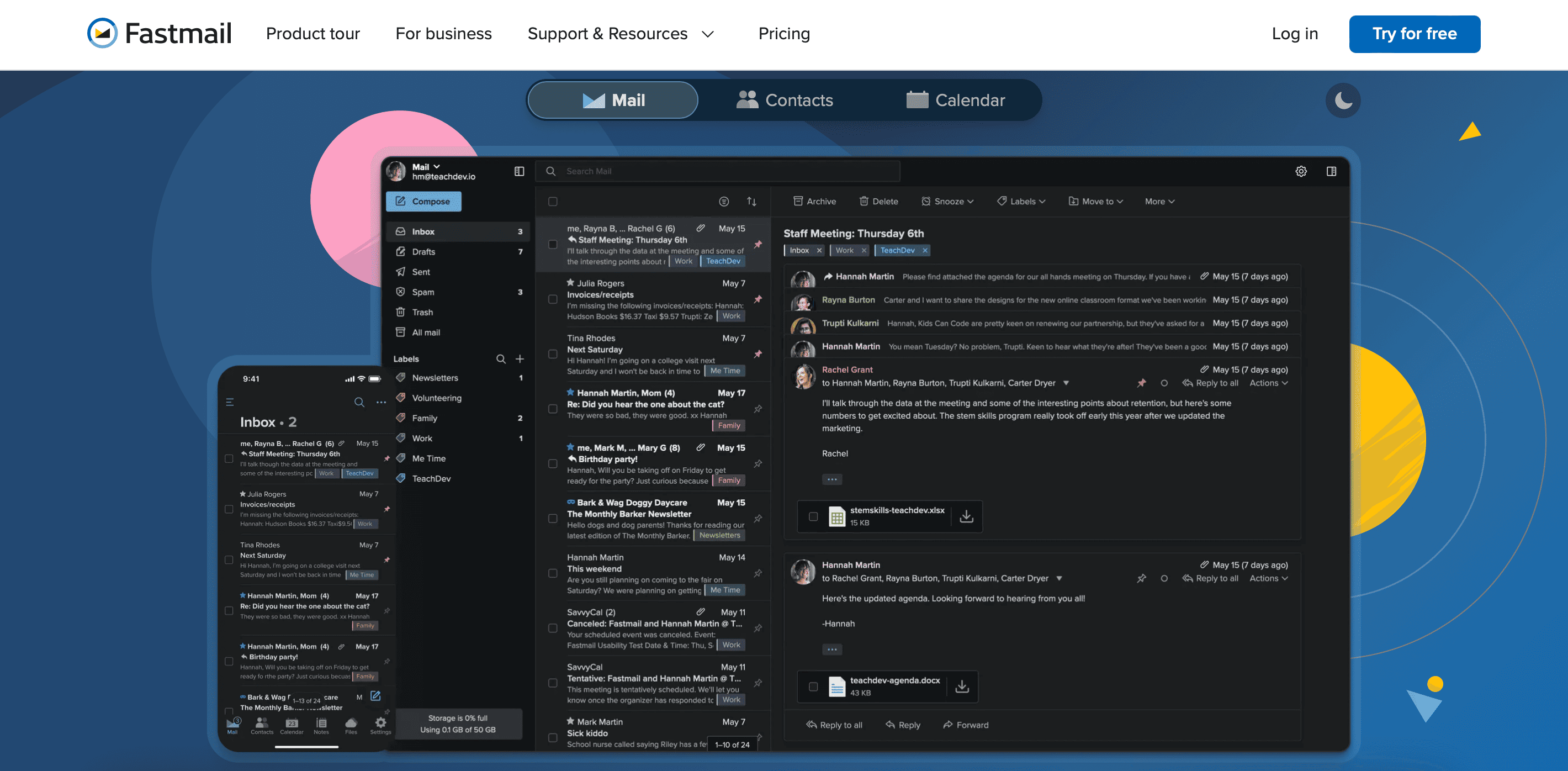Would you pay an invoice that came from john.doe@gmail.com? I didn’t think so! Your business needs a professional custom domain that comes across as reliable and trustworthy. So it’s time to choose an email hosting provider to get one for your business. In case you’re unsure what email hosting is and if your business truly needs one, check out our comparison guide on the best email hosting providers.
I’ve spoken to several deliverability specialists, conducted thorough research, and tested different options. I’m now ready to share with you the best email hosting companies to consider for your business. But before we delve into the comparison, let me outline the criteria I used to evaluate the providers.
Best email hosting providers: snapshot
- Google Workspace: for businesses and teams that need seamless integration with Google’s productivity tools like Docs, Drive, and Meet.
- Microsoft 365: for organizations looking for a comprehensive suite with email hosting and Microsoft Office tools.
- Neo Mail: for small businesses and entrepreneurs looking for affordable email hosting with focus on security.
- Zoho Workplace: for small to medium-sized businesses seeking affordable email hosting with integrated CRM and productivity apps.
- Spacemail: for solo founders, freelancers, and lean teams that want a secure and modern email with AI spam filtering and a sleek calendar at an affordable price.
- IceWarp: for teams that require an all-in-one solution with email, collaboration tools, real-time communication features, and large storage space.
- Proton Mail: for privacy-focused individuals or organizations that prioritize end-to-end encrypted email.
- MXroute: for users who want a low-cost, no-frills email hosting service with generous storage.
- Fastmail: for individuals or teams looking for a simple, reliable email hosting solution with strong privacy features.
Here’s a comparison of the security, support, and user rating with the most frequent complaints on these providers. Click on the links to jump to individual reviews.
| Email hosting provider | Security | Support | User rating on G2/Capterra and main complaints |
| Google Workspace | ⭐⭐⭐⭐ | 🙂 | 4.6/5 Unresponsive support / frequent policy changes |
| Microsoft 365 | ⭐⭐⭐⭐ | 🙂 | 4.6/5 Performance lags and downtime / outdated interface |
| Neo Mail | ⭐⭐⭐⭐ | 🙂 | 4.6/5 Relatively new, lacks offline functionality |
| Zoho Workplace | ⭐⭐⭐ | 😐* | 4.5/5 Apps operation issues / compatibility with other apps/ poor support |
| Spacemail | ⭐⭐⭐⭐ | 🙂 | 4.5/5 Limited built-in collaboration suite; smaller third-party ecosystem/integrations than long-established suites. |
| IceWarp | ⭐⭐⭐⭐ | 🙂* | 4.2/5 Lacking features/ Messy UI |
| Proton Mail | ⭐⭐⭐⭐⭐ | 😐* | 4.4/5 Limited storage/can get slow when mailbox gets full |
| MXroute | ⭐⭐⭐ | ☹️ | 4.4/5 Slow and complicated management panel/ Slow customer service |
| Fastmail | ⭐⭐⭐⭐ | 🙂 | 4.3/5 Limited mobile app/support is available only via emails |
**TrustPilot score
Email hosting providers – what to look for?
It’s clear that every team, company, or organization is seeking a solution that is tailored to their specific needs. When I was collecting the criteria, I tried to think broader and select characteristics that would be relevant to companies across various industries. Also, I included essential factors that should be considered by every team. Here’s what I came up with:
- Storage space – depending on your company’s needs, the amount of storage an email hosting provider offers can be a dealbreaker. I have found options that give you flexibility; whether you require minimal storage or much more.
- Cost – there are cheaper and more expensive options on my list. The more expensive options often come with a range of additional functionality that can help with emails and team collaboration. However, if you don’t need those extras, there are also more affordable options.
- Security – I checked what security measures each provider offers, focusing on encryption, spam protection, and compliance with regulations like GDPR, HIPAA, and FedRAMP. If your business handles sensitive data, these features are must-haves for you.
- Scalability and ease to switch – I looked at how many plans each service has and how diverse they are so that you can upgrade whenever you need it. Also, it’s important to know that you can easily switch a vendor with minimal manual work.
- Ease of use – some tools have complicated interfaces suitable for people with tech backgrounds or vast experience, while others are intuitive and easy to navigate even for non-techies. I checked the services’ interfaces, knowledge bases, and documentation to see if they are clear and concise.
- Free trial – there are several providers that offer a free trial and one that has a (limited) free plan.
- Customer reviews – some problems are only revealed after weeks or months. I checked what users say about email hosting providers on G2 and Capterra and the typical issues they face while working with them.

Google Workspace

With almost 2 billion users worldwide (a 43% market share in email services), Gmail is one of the most famous services for personal emails in the world. It’s no suprise so many people choose Google Workspace for their business emails. Familiarity with the interface and G Suite collaboration tools, such as Google Docs, Sheets, Meet, Drive, Calendar, and Chat, make it a top candidate for their business email hosting.
Google Workspace offers a 14-day trial for new users, allowing up to 10 team members. The paid plan starts at $6 per person and includes 30 GB of cloud storage per person and up to 30 alias addresses. The Enterprise plan, which provides 5 TB of storage per user with the option to request more, is available upon request.
Now, let’s cover the pros of the service:
- 14-day free trial.
- User-friendly, familiar to many interface, clear documentation, and extended knowledge base.
- A suite of convenient collaboration tools for large, medium, and small businesses that guarantees seamless integration across different platforms.
- Simple integration with a vast number of third-party tools.
- Two-factor authentication (2FA), advanced protection program (physical security keys for high-risk users), TLS email encryption (support of E2EE and CSE in enterprise tiers), data loss prevention (DLP), endpoint management (device protection), AI-powered threat detection.
All tools have cons. Let’s look at why some people don’t choose Google Workspace as a cloud email service for their business:
- 24/7 support is available only for administrators, and it’s not very responsive.
- Expensive for large teams, especially when scaling up.
- It’s complex to migrate data away from Google, even with the export tools that the service provides.
Microsoft 365

Compared to Google Workspace, Microsoft 365 appears to be the closest competitor with its whopping 345 million users worldwide. Similar to Google Workspace, Microsoft 365 offers an office suite of collaboration and productivity tools like Word, Excel, PowerPoint, OneDrive, and Teams. The service is popular among companies of all sizes and is also often chosen because of its product ecosystem.
New users can try Microsoft 365 email hosting for free for one month for a team of up to six people. The starter plan costs $6 per user/month, offering 50 GB of email storage, 1 TB of OneDrive storage, and access to the suite of tools. If you’re only interested in corporate email hosting, you can opt for Microsoft Exchange, which starts at $4 per user/month and provides 50 GB of storage space.
The reasons behind Microsoft 365’s popularity:
- 1-month free trial.
- Familiarity with the tools.
- Full-featured desktop apps.
- A separate email hosting service (Microsoft Exchange) in case you don’t need all the other tools.
- TLS email encryption (manual setup of E2EE and CSE in enterprise tiers), advanced threat protection (protection against phishing, malware, and zero-day threats with safe links and attachments), multi-factor authentication, DLP and compliance, endpoint security, mobile device management.
The main cons of the service are:
- Expensive for small teams needing a highly secure solution, as most security features are available only in the higher-tier plans.
- Hard to migrate your data and switch from.
- Steeper learning curve, especially with some complex tools like SharePoint or Power Automate.
Neo Mail

Neo Mail is an affordable and secure business email platform designed to help small businesses and entrepreneurs scale up with a free professional-looking email address. If you don’t own a domain name, Neo Mail offers one free of cost, thereby making it easier for upcoming businesses to get online. Neo also offers an AI-powered website builder to further strengthen online presence and establish credibility.
Neo Mail offers its customers a seamless and speedy setup, coupled with powerful email features that address the entire lifecycle of an email conversation; you can quickly craft a professional message using the AI email writer or email designer, schedule it for any time, and set up a follow-up reminder in case you don’t receive a reply. You can also track who opens your email, clicks links, or downloads attachments.
Plans start at $1.99 per account, which includes 15 GB of space, advanced security, and basic email features. For the more premium features such as 100 GB space, appointment booking, email campaigns, AI email writer, advanced tracking, and so on, the price is $7.99 per account.
Pros:
- A free website and a free co.site domain name, along with a business email account.
- Know when your emails are read, links clicked, and attachments downloaded.
- Multiple accounts can be accessed at the same time from one place.
- Available as webmail, and desktop and native mobile apps.
- The features are tailored to support the success of small businesses.
- Easy to migrate data into.
- High focus on email deliverability and security with two-factor authentication and data encryption.
Cons:
- Requires an active internet connection to function.
- No collaboration tools like document sharing.
Zoho Workplace

Zoho Workplace is a more affordable and flexible solution for teams in need of email hosting and a collaborative space similar to Google Workspace and Microsoft 365. The provider offers a suite of tools for managing emails, documents, files, and team collaboration.
Zoho offers a 15-day free trial for new users. The paid plan that includes dedicated email hosting solely costs €0.90 per user/month, providing 5 GB of email storage or 10 GB for €1.13. The plan that gives you access to all Zoho tools is called Workplace and costs €2.70 per user, per month, offering 30 GB of storage space.
Many small teams prefer Zoho because they can use it as a free email hosting service. Zoho offers a forever free email hosting plan for teams of up to five people, which includes 5 GB of storage per user and allows creating one custom domain name.
Reasons for Zoho’s popularity:
- 15-day free trial.
- Forever free plan for teams of up to five people.
- Can be bought as a bunch of tools or separately, as an email hosting only (Zoho Mail)
- Affordable pricing for email hosting and a set of team collaboration tools.
- User-friendly interface, clear guidance, and documentation.
- Several migration tools to help users move data to and from the platform.
- TLS email encryption (available manual configuration of S/MIME and PGP), two-factor authentication, phishing and spam protection, data loss prevention, and mobile device management.
Cons of Zoho Workplace:
- Only offers 5GB per user in the lowest-tier plan which is significantly less compared to the offerings of Google Workspace and Microsoft 365.
- Free and basic plans support is limited with email, knowledge base articles, and FAQs. Live chat and phone support are reserved for higher-tier plans.
- Complex admin panel that is difficult to work with, especially for people with no or little experience.
Spacemail

Spacemail is a business email built by Spaceship, an innovative web services platform for managing domain names, web hosting, email, and other digital products needed to run an online presence. You can set up Spacemail, connect it to your existing domain in minutes with the Unbox™ tool. Easily migrate your emails from another provider with the migration tool. You can create events, send invites, and manage meetings without switching apps – both on desktop and mobile. It supports IMAP/SMTP/POP3 for any client (Outlook, Apple Mail, Thunderbird), offers aliases, 2FA, password-protected messages, activity logs, and tracker-link removal.
Spacemail has 30-day free trials on all plans. Pricing starts at only $0.68/month on a monthly plan (or $5.64/year on an annual plan) for Starter Plan that includes 1 mailbox, 3GB of storage and 5 aliases, followed by Pro Plan for only $0.88/month (or $6.88/year) with 1 mailbox, 5GB of storage and 10 aliases, and its Advanced Plan for $2.48/month (or $20.08/year) that includes 5 mailboxes, 10GB of storage and unlimited aliases.
Why it stands out:
- Built-in calendar right in the inbox (create events, send invites, day/week/month views)
- One-click Unbox™ setup to connect your domain and start fast
- 30-day free trials & best pricing among competitors
- Works with any email client
- Strong security: 2FA, password-protected messages, tracking-link removal, and Jellyfish spam protection
- AI email assistant to help draft and refine messages
Cons
- Not a full collaboration suite (docs/chat/video); best for teams that primarily need email and a built-in calendar.
- Lower-tier plans have modest per-mailbox storage; power users may prefer higher tiers or add-ons. It’s possible to purchase additional mailboxes and storage as your business needs demand.
IceWarp

Similar to previous competitors, IceWarp offers email hosting services and a suite of collaboration and communication tools like calendar, team chat, documents, file storage, and video conferencing. IceWarp’s competitive advantage over its competitors is a huge disk space: 200GB of email storage and 1TB of file storage per user. Additionally, users have the option to select from seven different data centers located around the world to store their information, which can be critical for meeting compliance requirements or ensuring data sovereignty.
The service offers a one-month free trial, an email hosting cloud solution, and software for self-hosted deployment that you can install on your servers. The prices start at €23 for a team of 10 (which is the minimum number required to use the service), while the self-hosted version costs €3.50 per user (minimum team size isn’t specified).
Pros of the IceWarp’s email hosting service provider:
- One-month free trial.
- Generous storage space with reasonable pricing even for large teams.
- A bunch of collaboration tools in addition to hosted email service.
- Cloud email hosting and self-hosted options.
- Great attention to security and privacy with email TLS encryption, anti-spam and anti-virus protection, 2-factor authentication, mobile device security, GDPR compliance, secure data centers, and advanced access controls.
Cons of the IceWarp’s email hosting service:
- Requirements for a minimum team size of 10 people.
- Support is sold as an additional feature; free support is limited to documentation, knowledge base, and email.
- Fewer tools for team collaboration compared to other platforms.
- Less polished UI.
Proton Mail

Proton Mail is based in Switzerland, a country known for its strong data protection laws. It was developed by scientists from CERN, the European Organization for Nuclear Research, so no wonder it’s one of the most secure solutions on my list and on the whole market. The provider uses end-to-end and zero-access encryption, which means no one can read your emails except for you and the intended recipients. Not even Proton Mail itself.
Proton Mail’s business plans start at €6.99 per user, which includes 15 GB of storage, 3 custom email domain names, and access to Mail and Calendar features. If you need a whole bundle that includes Mail, Calendar, VPN, Pass (a password manager app), 1 TB of storage per user, and up to 15 custom email addresses, the price increases to €12.99 per user.
Proton Mail also offers special pricing for non-profits and journalists and a free plan for personal use. For businesses, there’s a 30-day money-back guarantee if you’re not completely satisfied with the service.
Pros of the Proton Mail service:
- 30-day money-back guarantee.
- Great focus on privacy.
- Customizable security settings.
- End-to-end email encryption, zero access architecture (Proton Mail cannot access user data due to its encryption model, MFA/2FA, DDoS protection, advanced physical security (servers located in secure, underground data centers in Switzerland).
Cons of the Proton Mail service:
- Switching email hosting is difficult because all the emails are encrypted.
- Limited features for business use.
- Free support includes documentation, knowledge base, and email. Dedicated support is sold separately.
- Users are obliged to use a built-in email client or upgrade their plan to get a feature (Proton Bridge) to use a third-party email client of their choice, like Gmail or Outlook.
MXroute
Trustpilot 4.5

MXroute is a great option for those, who are looking for a budget-friendly solution for their business needs. Unlike our previous contestants, this one focuses solely on email hosting without any additional offerings.
MXroute pricing starts at $49 per year for 10 GB of storage, unlimited domains, and unlimited email accounts. For $49 per year, you get 25 GB of storage, and 50 GB for $59 per year. The service offers a bunch of plans, the largest of which includes 1TB of storage space and will cost you $550 annually.
Users who don’t need a lot of space can choose MXroute’s life plan which costs $199. This plan can be upgraded at any time.
Pros of MXroute:
- Affordable pricing compared to other email hosting solutions.
- Unlimited email accounts and domains, even with entry-level plans.
- A clear email hosting offer without unnecessary features and tools.
- TLS email encryption, spam and virus filtering, 2-factor authentication.
Cons of MXroute:
- No free trial.
- No additional collaboration tools like document sharing or calendars.
- Customer support boils down to community forums.
- Lack of advanced security features like end-to-end encryption, extensive compliance support, and advanced threat protection.
Fastmail

If you’re looking for a simple solution for a non-tech team, Fastmail is the right choice for you. Fastmail is known for its intuitive interface, privacy-first approach, and clear offer—email hosting with a few additional features. Despite the absence of collaboration tools, Fastmail users get everything they need from an email hosting provider—advanced search tools to quickly find emails, robust spam filtering, calendar, and no lock-in policies, allowing users to easily export their data in case they want to switch vendors.
You can get acquainted with the service during a 30-day free trial if you want to test it before you open your wallet. The paid plan, which enables you to create custom business addresses starts at $5 per user/month if billed annually. This plan includes 60 GB of storage, expert support from real people, email aliases, and a shared calendar. For $9 a month, you’ll get 150 GB of total storage per user.
Reasons why users choose Fastmail:
- 30-day free trial.
- Clear, user-friendly interface that is easy to navigate and understand for non-technical users.
- Large storage space.
- Responsive customer support is provided by real people.
- No lock-in policy.
- TLS email encryption, 2-factor authentication, spam and phishing protection, account recovery options.
Cons of the Fastmail service:
- Not the most budget-friendly option compared to other email server providers.
- Absence of team collaboration tools.
- Only three plans to choose from.
Summing up
On my list, I’ve included well-established, reliable, and trusted by thousands industry giants; an alternative with a similar suite of collaboration tools for teams; a provider with the largest disk space; a highly secure option; the most budget-friendly service; and a user-friendly email hosting service perfect for those who want something simple and straightforward.
I chose not to add LuxSci to this list because it doesn’t share any pricing information publicly and requires a personal request. I also didn’t include Rackspace, Bluehost, A2 Hosting, and other cloud or web hosting solutions whose main focus isn’t email hosting.
I hope this detailed comparison helped you identify your main needs and choose the right provider for your business.



